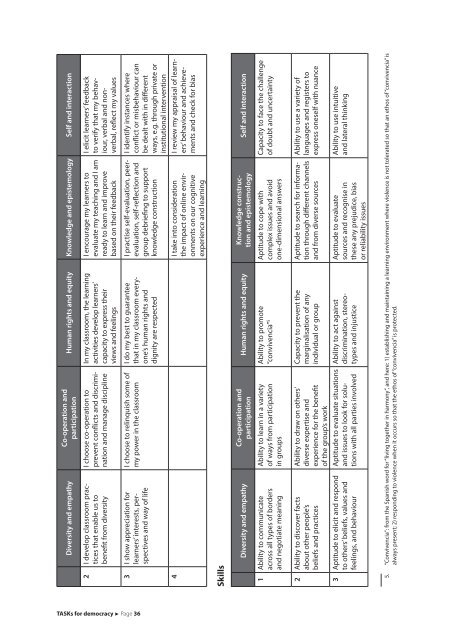TASKs for democracy
4NYw4W
4NYw4W
You also want an ePaper? Increase the reach of your titles
YUMPU automatically turns print PDFs into web optimized ePapers that Google loves.
Diversity and empathy<br />
2 I develop classroom practices<br />
that enable us to<br />
benefit from diversity<br />
Co-operation and<br />
participation<br />
I choose co-operation to<br />
prevent conflicts and discrimination<br />
and manage discipline<br />
Human rights and equity Knowledge and epistemology Self and interaction<br />
In my classroom, the learning<br />
activities develop learners’<br />
capacity to express their<br />
views and feelings<br />
I encourage my learners to<br />
evaluate my teaching and I am<br />
ready to learn and improve<br />
based on their feedback<br />
I elicit learners’ feedback<br />
to verify that my behaviour,<br />
verbal and nonverbal,<br />
reflect my values<br />
3 I show appreciation <strong>for</strong><br />
learners’ interests, perspectives<br />
and way of life<br />
I choose to relinquish some of<br />
my power in the classroom<br />
I do my best to guarantee<br />
that in my classroom everyone’s<br />
human rights and<br />
dignity are respected<br />
I practise self-evaluation, peerevaluation,<br />
self-reflection and<br />
group debriefing to support<br />
knowledge construction<br />
4 I take into consideration<br />
the impact of online environments<br />
on our cognitive<br />
experience and learning<br />
I identify instances where<br />
conflict or misbehaviour can<br />
be dealt with in different<br />
ways, e.g. through private or<br />
institutional intervention<br />
I review my appraisal of learners’<br />
behaviour and achievements<br />
and check <strong>for</strong> bias<br />
Skills 5 Diversity and empathy<br />
1 Ability to communicate<br />
across all types of borders<br />
and negotiate meaning<br />
Co-operation and<br />
participation<br />
Ability to learn in a variety<br />
of ways from participation<br />
in groups<br />
Human rights and equity<br />
Knowledge construction<br />
and epistemology<br />
Ability to promote<br />
Aptitude to cope with<br />
“convivencia” 5 complex issues and avoid<br />
one-dimensional answers<br />
Self and interaction<br />
Capacity to face the challenge<br />
of doubt and uncertainty<br />
2 Ability to discover facts<br />
about other people’s<br />
beliefs and practices<br />
3 Aptitude to elicit and respond<br />
to others’ beliefs, values and<br />
feelings, and behaviour<br />
Ability to draw on others’<br />
diverse expertise and<br />
experience <strong>for</strong> the benefit<br />
of the group’s work<br />
Aptitude to evaluate situations<br />
and issues to look <strong>for</strong> solutions<br />
with all parties involved<br />
Capacity to prevent the<br />
marginalisation of any<br />
individual or group<br />
Ability to act against<br />
discrimination, stereotypes<br />
and injustice<br />
Aptitude to search <strong>for</strong> in<strong>for</strong>mation<br />
through different channels<br />
and from diverse sources<br />
Aptitude to evaluate<br />
sources and recognise in<br />
these any prejudice, bias<br />
or reliability issues<br />
Ability to use a variety of<br />
languages and registers to<br />
express oneself with nuance<br />
Ability to use intuitive<br />
and lateral thinking<br />
5. “Convivencia”: from the Spanish word <strong>for</strong> “living together in harmony”, and here: 1) establishing and maintaining a learning environment where violence is not tolerated so that an ethos of “convivencia” is<br />
always present; 2) responding to violence when it occurs so that the ethos of “convivencia” is protected.<br />
<strong>TASKs</strong> <strong>for</strong> <strong>democracy</strong> Page 36


